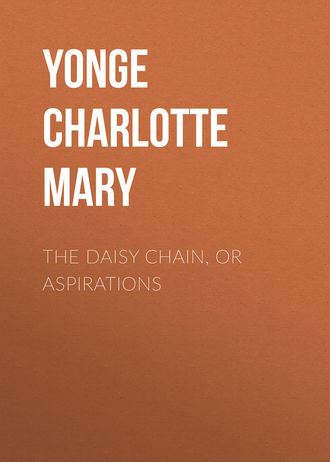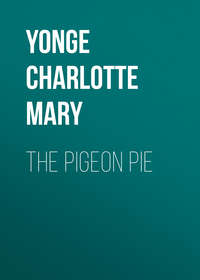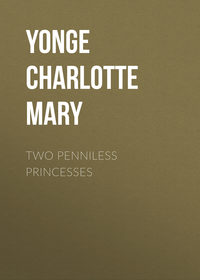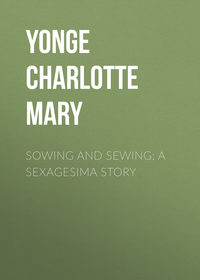
The Daisy Chain, or Aspirations
“What would Ethel say,” wrote Flora, “to have our little Meta as Lady of the Manor of Cocksmoor? He has begun to talk about Drydale, and there are various suspicious circumstances that Lady Leonora marks with the eyes of a discreet dowager. It was edifying to see how, from smiles, we came to looks, and by and by to confidential talks, which have made her entirely forgive me for having so many tall brothers. Poor dear old Mr. Rivers! Lady Leonora owns that it was the best thing possible for that sweet girl that he did not live any longer to keep her in seclusion; it is so delightful to see her appreciated as she deserves, and with her beauty and fortune, she might make any choice she pleases. In fact, I believe Lady Leonora would like to look still higher for her, but this would be mere ambition, and we should be far better satisfied with such a connection as this, founded on mutual and increasing esteem, with a man so well suited to her, and fixing her so close to us. You must not, however, launch out into an ocean of possibilities, for the good aunt has only infected me with the castle-building propensities of chaperons, and Meta is perfectly unconscious, looking on him as too hopelessly middle-aged, to entertain any such evil designs, avowing freely that she likes him, and treating him very nearly as she does papa. It is my business to keep ‘our aunt,’ who, between ourselves, has, below the surface, the vulgarity of nature that high-breeding cannot eradicate, from startling the little humming-bird, before the net has been properly twined round her bright little heart. As far as I can see, he is much smitten, but very cautious in his approaches, and he is wise.”
Margaret did not know what dismay she conveyed, as she handed this letter to her sister. There was no rest for Ethel till she could be alone with her father. “Could nothing prevent it? Could not Flora be told of Mr. Rivers’s wishes?” she asked.
“His wishes would have lain this way.”
“I do not know that.”
“It is no concern of ours. There is nothing objectionable here, and though I can’t say it is not a disappointment, it ought not to be. The long and short of it is, that I never ought to have told you anything about it.”
“Poor Norman!”
“Absurd! The lad is hardly one-and-twenty. Very few marry a first love.” (Ah, Ethel!) “Poor old Rivers only mentioned it as a refuge from fortune-hunters, and it stands to reason that he would have preferred this. Anyway, it is awkward for a man with empty pockets to marry an heiress, and it is wholesomer for him to work for his living. Better that it should be out of his head at once, if it were there at all. I trust it was all our fancy. I would not have him grieved now for worlds, when his heart is sore.”
“Somehow,” said Ethel, “though he is depressed and silent, I like it better than I did last Christmas.”
“Of course, when we were laughing out of the bitterness of our hearts,” said Dr. May, sighing. “It is a luxury to let oneself alone to be sorrowful.”
Ethel did not know whether she desired a tete-a-tete with Norman or not. She was aware that he had seen Flora’s letter, and she did not believe that he would ever mention the hopes that must have been dashed by it; or, if he should do so, how could she ever guard her father’s secret? At least, she had the comfort of recognising the accustomed Norman in his manner, low-spirited, indeed, and more than ever dreamy and melancholy, but not in the unnatural and excited state that had made her unhappy about him. She could not help telling Dr. Spencer that this was much more the real brother.
“I dare say,” was the answer, not quite satisfactory in tone.
“I thought you would like it better.”
“Truth is better than fiction, certainly. But I am afraid he has a tendency to morbid self-contemplation, and you ought to shake him out of it.”
“What is the difference between self-contemplation and self-examination?”
“The difference between your brother and yourself. Ah! you think that no answer. Will you have a medical simile? Self-examination notes the symptoms and combats them; self-contemplation does as I did when I was unstrung by that illness at Poonshedagore, and was always feeling my own pulse. It dwells on them, and perpetually deplores itself. Oh, dear! this is no better—what a wretch I am. It is always studying its deformities in a moral looking-glass.”
“Yes, I think poor Norman does that, but I thought it right and humble.”
“The humility of a self-conscious mind. It is the very reverse of your father, who is the most really humble man in existence.”
“Do you call self-consciousness a fault?”
“No. I call it a misfortune. In the vain, it leads to prudent vanity; in the good, to a painful effort of humility.”
“I don’t think I quite understand what it is.”
“No, and you have so much of your father in you, that you never will. But take care of your brother, and don’t let his brains work.”
How Ethel was to take care of him she did not know; she could only keep a heedful eye on him, and rejoice when he took Tom out for a long walk—a companion certainly not likely to promote the working of the brain—but though it was in the opposite direction to Cocksmoor, Tom came home desperately cross, snubbed Gertrude, and fagged Aubrey; but, then, as Blanche observed, perhaps that was only because his trousers were splashed.
In her next solitary walk to Cocksmoor, Norman joined Ethel. She was gratified, but she could not think of one safe word worth saying to him, and for a mile they preserved an absolute silence, until he first began, “Ethel, I have been thinking—”
“That you have!” said she, between hope and dread, and the thrill of being again treated as his friend.
“I want to consult you. Don’t you think now that Richard is settled at home, and if Tom will study medicine, that I could be spared.”
“Spared!” exclaimed Ethel. “You are not much at home.”
“I meant more than my present absences. It is my earnest wish—” he paused, and the continuation took her by surprise. “Do you think it would give my father too much pain to part with me as a missionary to New Zealand?”
She could only gaze at him in mute amazement.
“Do you think he could bear it?” said Norman hastily.
“He would consent,” she replied. “Oh, Norman, it is the most glorious thing man can do! How I wish I could go with you.”
“Your mission is here,” said Norman affectionately.
“I know it is—I am contented with it,” said Ethel; “but oh! Norman, after all our talks about races and gifts, you have found the more excellent way.”
“Hush! Charity finds room at home, and mine are not such unmixed motives as yours.”
She made a sound of inquiry.
“I cannot tell you all. Some you shall hear. I am weary of this feverish life of competition and controversy—”
“I thought you were so happy with your fellowship. I thought Oxford was your delight.”
“She will always be nearer my heart than any place, save this. It is not her fault that I am not like the simple and dutiful, who are not fretted or perplexed.”
“Perplexed?” repeated Ethel.
“It is not so now,” he replied. “God forbid! But where better men have been led astray, I have been bewildered; till, Ethel, I have felt as if the ground were slipping from beneath my feet, and I have only been able to hide my eyes, and entreat that I might know the truth.”
“You knew it!” said Ethel, looking pale, and gazing searchingly at him.
“I did, I do; but it was a time of misery when, for my presumption, I suppose, I was allowed to doubt whether it were the truth.”
Ethel recoiled, but came nearer, saying, very low, “It is past.”
“Yes, thank Him who is Truth. You all saved me, though you did not know it.”
“When was this?” she asked timidly.
“The worst time was before the Long Vacation. They told me I ought to read this book and that. Harvey Anderson used to come primed with arguments. I could always overthrow them, but when I came to glory in doing so, perhaps I prayed less. Anyway, they left a sting. It might be that I doubted my own sincerity, from knowing that I had got to argue, chiefly because I liked to be looked on as a champion.”
Ethel saw the truth of what her friend had said of the morbid habit of self-contemplation.
“I read, and I mystified myself. The better I talked, the more my own convictions failed me; and, by the time you came up to Oxford, I knew how you would have shrunk from him who was your pride, if you could have seen into the secrets beneath.”
Ethel took hold of his hand. “You seemed bright,” she said.
“It melted like a bad dream before—before the humming-bird, and with my father. It was weeks ere I dared to face the subject again.”
“How could you? Was it safe?”
“I could not have gone on as I was. Sometimes the sight of my father, or the mountains and lakes in Scotland, or—or—things at the Grange, would bring peace back; but there were dark hours, and I knew that there could be no comfort till I had examined and fought it out.”
“I suppose examination was right,” said Ethel, “for a man, and defender of the faith. I should only have tried to pray the terrible thought away. But I can’t tell how it feels.”
“Worse than you have power to imagine,” said Norman, shuddering. “It is over now. I worked out their fallacies, and went over the reasoning on our side.”
“And prayed—” said Ethel.
“Indeed I did; and the confidence returned, firmer, I hope, than ever. It had never gone for a whole day.”
Ethel breathed freely. “It was life or death,” she said, “and we never knew it!”
“Perhaps not; but I know your prayers were angel-wings ever round me. And far more than argument, was the thought of my father’s heart-whole Christian love and strength.”
“Norman, you believed, all the time, with your heart. This was only a bewilderment of your intellect.”
“I think you are right,” said Norman. “To me the doubt was cruel agony—not the amusement it seems to some.”
“Because our dear home has made the truth, our joy, our union,” said Ethel. “And you are sure the cloud is gone, and for ever?” she still asked anxiously.
He stood still. “For ever, I trust,” he said. “I hold the faith of my childhood in all its fullness as surely as—as ever I loved my mother and Harry.”
“I know you do,” said Ethel. “It was only a bad dream.”
“I hope I may be forgiven for it,” said Norman. “I do not know how far it was sin. It was gone so far as that my mind was convinced last Christmas, but the shame and sting remained. I was not at peace again till the news of this spring came, and brought, with the grief, this compensation—that I could cast behind me and forget the criticisms and doubts that those miserable debates had connected with sacred words.”
“You will be the sounder for having fought the fight,” said Ethel.
“I do not dread the like shocks,” said her brother, “but I long to leave this world of argument and discussion. It is right that there should be a constant defence and battle, but I am not fit for it. I argue for my own triumph, and, in heat and harassing, devotion is lost. Besides, the comparison of intellectual power has been my bane all my life.”
“I thought ‘praise was your penance here.’”
“I would fain render it so, but—in short, I must be away from it all, and go to the simplest, hardest work, beginning from the rudiments, and forgetting subtle arguments.”
“Forgetting yourself,” said Ethel.
“Right. I want to have no leisure to think about myself,” said Norman. “I am never so happy as at such times.”
“And you want to find work so far away?”
“I cannot help feeling drawn towards those southern seas. I am glad you can give me good-speed. But what do you think about my father?”
Ethel thought and thought. “I know he would not hinder you,” she repeated.
“But you dread the pain for him? I had talked to Tom about taking his profession; but the poor boy thinks he dislikes it greatly, though, I believe, his real taste lies that way, and his aversion only arises a few grand notions he has picked up, out of which I could soon talk him.”
“Tom will not stand in your place,” said Ethel.
“He will be more equable and more to be depended upon,” said Norman. “None of you appreciate Tom. However, you must hear my alternative. If you think my going would be too much grief for papa, or if Tom be set against helping him in his practice, there is an evident leading of Providence, showing that I am unworthy of this work. In that case I would go abroad and throw myself, at once, with all my might, into the study of medicine, and get ready to give my father some rest. It is a shame that all his sons should turn away from his profession.”
“I am more than ever amazed!” cried Ethel. “I thought you detested it. I thought papa never wished it for you. He said you had not nerve.”
“He was always full of the tenderest consideration for me,” said Norman. “With Heaven to help him, a man may have nerve for whatever is his duty.”
“How he would like to have you to watch and help. But New Zealand would be so glorious!”
“Glory is not for me,” said Norman. “Understand, Ethel, the choice is New Zealand, or going at once—at once, mind—to study at Edinburgh or Paris.”
“New Zealand at once?” said Ethel.
“I suppose I mast stay for divinity lectures, but my intention must be avowed,” said Norman hastily. “And now, will you sound my father? I cannot.”
“I can’t sound,” said Ethel. “I can only do things point-blank.”
“Do then,” said Norman, “any way you can! Only let me know which is best for him. You get all the disagreeable things to do, good old unready one,” he added kindly. “I believe you are the one who would be shoved in front, if we were obliged to face a basilisk.”
The brightness that had come over Norman, when he had discharged his cares upon her, was encouragement enough for Ethel. She only asked how much she was to repeat of their conversation.
“Whatever you think best. I do not want to grieve him, but he must not think it fine in me.”
Ethel privately thought that no power on earth could prevent him from doing that.
It was not consistent with cautious sounding, that Norman was always looking appealingly towards her; and, indeed, she could not wait long with such a question on her mind. She remained with her father in the drawing-room, when the rest were gone upstairs, and, plunging at once into the matter, she said, “Papa, there is something that Norman cannot bear to say to you himself.”
“Humming-birds to wit?” said Dr. May.
“No, indeed, but he wants to be doing something at once. What should you think of—of—there are two things; one is—going out as a missionary—”
“Humming-birds in another shape,” said the doctor, startled, but smiling, so as to pique her.
“You mean to treat it as a boy’s fancy!” said she.
“It is rather suspicious,” he said. “Well, what is the other of his two things?”
“The other is, to begin studying medicine at once, so as to help you.”
“Heyday!” cried Dr. May, drawing up his tall vigorous figure, “does he think me so very ancient and superannuated?”
What could possess him to be so provoking and unsentimental to-night? Was it her own bad management? She longed to put an end to the conversation, and answered, “No, but he thinks it hard that none of your sons should be willing to relieve you.”
“It won’t be Norman,” said Dr. May. “He is not made of the stuff. If he survived the course of study, every patient he lost, he would bring himself in guilty of murder, and there would soon be an end of him!”
“He says that a man can force himself to anything that is his duty.”
“This is not going to be his duty, if I can make it otherwise. What is the meaning of all this? No, I need not ask, poor boy, it is what I was afraid of!”
“It is far deeper,” said Ethel; and she related great part of what she had heard in the afternoon. It was not easy to make her father listen—his line was to be positively indignant, rather than compassionate, when he heard of the doubts that had assailed poor Norman. “Foolish boy, what business had he to meddle with those accursed books, when he knew what they were made of—it was tasting poison, it was running into temptation! He had no right to expect to come out safe—” and then he grasped tightly hold of Ethel’s hands, and, as if the terror had suddenly flashed on him, asked her, with dilated eye and trembling voice, whether she were sure that he was safe, and held the faith.
Ethel repeated his asseveration, and her father covered his face with his hands in thanksgiving.
After this, he seemed somewhat inclined to hold poor Oxford in horror, only, as he observed, it would be going out of the frying-pan into the fire, to take refuge at Paris—a recurrence to the notion of Norman’s medical studies, that showed him rather enticed by the proposal.
He sent Ethel to bed, saying he should talk to Norman and find out what was the meaning of it, and she walked upstairs, much ashamed of having so ill served her brother, as almost to have made him ridiculous.
Dr May and Norman never failed to come to an understanding, and after they had had a long drive into the country together, Dr May told Ethel that he was afraid, of what he ought not to be afraid of, that she was right, that the lad was very much in earnest now at any rate, and if he should continue in the same mind, he hoped he should not be so weak as to hold him from a blessed work.
From Norman, Ethel heard the warmest gratitude for his father’s kindness. Nothing could be done yet, he must wait patiently for the present, but he was to write to his uncle, Mr. Arnott, in New Zealand, and, without pledging himself, to make inquiries as to the mission; and in the meantime, return to Oxford, where, to his other studies, he was to add a course of medical lectures, which, as Dr. May said, would do him no harm, would occupy his mind, and might turn to use wherever he was.
Ethel was surprised to find that Norman wrote to Flora an expression of his resolution, that, if he found he could be spared from assisting his father as a physician, he would give himself up to the mission in New Zealand. Why should he tell any one so unsympathetic as Flora, who would think him wasted in either case?
CHAPTER XVII
Do not fear: Heaven is as near, By water, as by land.—LONGFELLOW.The fifth of May was poor Harry’s eighteenth birthday, and, as usual, was a holiday. Etheldred privately thought his memory more likely to be respected, if Blanche and Aubrey were employed, than if they were left in idleness; but Mary would have been wretched had the celebration been omitted, and a leisure day was never unwelcome.
Dr. Spencer carried off Blanche and Aubrey for a walk, and Ethel found Mary at her great resort—Harry’s cupboard—dusting and arranging his books, and the array of birthday gifts, to which, even to-day, she had not failed to add the marker that had been in hand at Christmas. Ethel entreated her to come down, and Mary promised, and presently appeared, looking so melancholy, that, as a sedative, Ethel set her down to the basket of scraps to find materials for a tippet for some one at Cocksmoor, intending, as soon as Margaret should be dressed, to resign her morning to the others, invite Miss Bracy to the drawing-room, and read aloud.
Gertrude was waiting for her walk, till nurse should have dressed Margaret, and was frisking about the lawn, sometimes looking in at the drawing-room window at her sisters, sometimes chattering to Adams at his work, or laughing to herself and the flowers, in that overflow of mirth, that seemed always bubbling up within her.
She was standing in rapt contemplation of a pear-tree in full blossom, her hands tightly clasped behind the back, for greater safety from the temptation, when, hearing the shrubbery gate open, she turned, expecting to see her papa, but was frightened at the sight of two strangers, and began to run off at full speed.
“Stop! Blanche! Blanche, don’t you know me?” The voice was that tone of her brother’s, and she stood and looked, but it came from a tall, ruddy youth, in a shabby rough blue coat, followed by a grizzled old seaman. She was too much terrified and perplexed even to run.
“What’s the matter! Blanche, it is I! Why, don’t you know me—Harry?”
“Poor brother Harry is drowned,” she answered; and, with one bound, he was beside her, and, snatching her up, devoured her with kisses.
“Put me down—put me down, please,” was all she could say.
“It is not Blanche! What? the little Daisy, I do believe!”
“Yes, I am Gertrude, but please let me go;” and, at the same time, Adams hurried up, as if he thought her being kidnapped, but his aspect changed at the glad cry, “Ha! Adams’ how are you? Are they all well?”
“‘Tisn’t never Master Harry! Bless me!” as Harry’s hand gave him sensible proof; “when we had given you up for lost!”
“My father well?” Harry asked, hurrying the words one over the other.
“Quite well, sir, but he never held up his head since he heard it, and poor Miss Mary has so moped about. If ever I thought to see the like—”
“So they did not get my letter, but I can’t stop. Jennings will tell you. Take care of him. Come, Daisy—” for he had kept her unwilling hand all the time. “But what’s that for?” pointing to the black ribbons, and, stopping short, startled.
“Because of poor Harry,” said the bewildered child.
“Oh, that’s right!” cried he, striding on, and dragging her in a breathless run, as he threw open the well-known doors; and, she escaping from him, hid her face in Mary’s lap, screaming, “He says he is Harry! he says he is not drowned!”
At the same moment Ethel was in his arms, and his voice was sobbing, “Ethel! Mary! home! Where’s papa?” One moment’s almost agonising joy in the certainty of his identity! but ere she could look or think, he was crying, “Mary! oh, Ethel, see—”
Mary had not moved, but sat as if turned to stone, with breath suspended, wide-stretched eyes, and death-like cheeks—Ethel sprang to her, “Mary, Mary dear, it is Harry! It is himself! Don’t you see? Speak to her, Harry.”
He seemed almost afraid to do so, but, recovering himself, exclaimed, “Mary, dear old Polly, here I am! Oh, won’t you speak to me?” he added piteously, as he threw his arm round her and kissed her, startled at the cold touch of her cheek.
The spell seemed broken, and, with a wild hoarse shriek that rang through the house, she struggled to regain her breath, but it would only come in painful, audible catches, as she held Harry’s hand convulsively.
“What have I done?” he exclaimed, in distress.
“What’s this! Who is this frightening my dear?” was old nurse’s exclamation, as she and James came at the outcry.
“Oh, nurse, what have I done to her?” repeated Harry.
“It is joy—it is sudden joy!” said Ethel. “See, she is better now—”
“Master Harry! Well, I never!” and James, “with one wring of the hand, retreated, while old nurse was nearly hugged to death, declaring all the time that he didn’t ought to have come in such a way, terrifying every one out of their senses! and as for poor Miss May—
“Where is she?” cried Harry, starting at the sight of the vacant sofa.
“Only upstairs,” said Ethel; “but where’s Alan? Is not he come?”
“Oh, Ethel, don’t you know?” His face told but too plainly.
“Nurse! nurse, how shall we tell her?” said Ethel.
“Poor dear!” exclaimed nurse, sounding her tongue on the roof of her mouth. “She’ll never abear it without her papa. Wait for him, I should say. But bless me, Miss Mary, to see you go on like that, when Master Harry is come back such a bonny man!”
“I’m better now,” said Mary, with an effort. “Oh, Harry! speak to me again.”
“But Margaret!” said Ethel, while the brother was holding Mary in his embrace, and she lay tremulous with the new ecstasy upon his breast—“but Margaret. Nurse, you must go up, or she will suspect. I’ll come when I can; speak quietly. Oh! poor Margaret! If Richard would but come in!”
Ethel walked up and down the room, divided between a tumult of joy, grief, dread, and perplexity. At that moment a little voice said at the door, “Please, Margaret wants Harry to come up directly.”
They looked one upon another in consternation. They had never thought of the child, who, of course, had flown up at once with the tidings.
“Go up, Miss Ethel,” said nurse.
“Oh! nurse, I can’t be the first. Come, Harry, come.”









